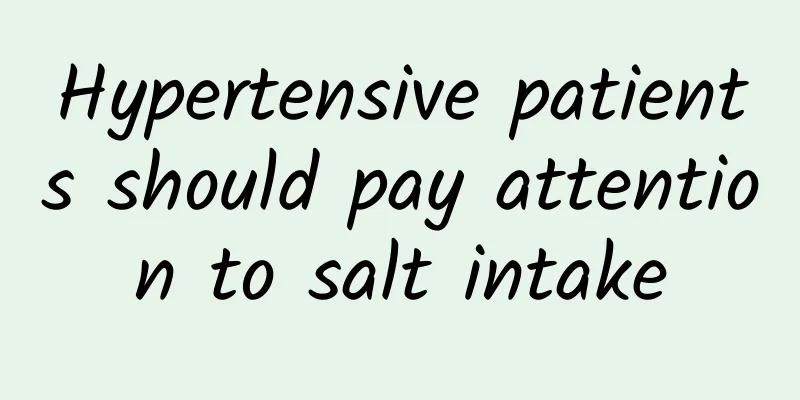Hypertensive patients should pay attention to salt intake

|
Author: Zhao Xia Xuanwu Hospital, Capital Medical University Reviewer: Xia Jinggang, Chief Physician, Xuanwu Hospital, Capital Medical University Figure 1 Copyright image, no permission to reprint Hypertension is a common cardiovascular disease. If it is not controlled in time, it will increase the risk of damage to the heart, cerebral blood vessels, kidneys and other organs. Dietary management is very important for patients with hypertension, and the most critical point is to control salt intake. So, what are the precautions for hypertensive patients to eat salt? First of all, patients with hypertension should reduce their salt intake, and it is generally recommended not to exceed 5 grams per day. Too much salt will increase the body's water content, increase blood volume and blood pressure. At the same time, we should also pay attention to avoid the intake of hidden salt, such as soy sauce, vinegar, MSG, pickles, pickles, ham, bacon and other foods with high salt content. Secondly, patients with hypertension should choose low-sodium salt or sodium-free salt instead of ordinary table salt. Low-sodium salt or sodium-free salt replaces part or all of the sodium with other minerals such as potassium or magnesium, which can reduce the impact of sodium on blood pressure. However, not all patients with hypertension are suitable for low-sodium salt or sodium-free salt. For example, patients with renal insufficiency or taking diuretics and other drugs should use it under the guidance of a doctor. Finally, patients with hypertension should appropriately increase their intake of minerals such as calcium, magnesium, and potassium. These minerals can help regulate the body's water balance and vascular tension, and have a certain effect on lowering blood pressure. Foods rich in these minerals include milk, soy products, nuts, green leafy vegetables, bananas, citrus fruits, etc. Figure 2 Copyright image, no permission to reprint Tips for controlling salt in daily life 1. Reduce the number of times you eat out and eat takeout: Most food prepared in restaurants has a high salt content. When dining out or ordering takeout, you should actively request low-salt flavors, give priority to low-salt dishes, and try to reduce the frequency. Figure 3 Copyright image, no permission to reprint 2. Reduce salt intake gradually: Use a salt-limiting spoon or beer bottle cap to control salt. A full beer bottle cap (without the rubber pad) contains about 6 grams of salt. Add a little less salt each time you cook, gradually reducing salt intake, and eventually reaching a salt level of 5 grams per day. 3. Add salt when the dish is out of the pot: When adding salt later, the salt adheres to the surface of the dish. Use less salt than adding salt earlier, and the saltiness of the taste is basically the same. Figure 4 Copyright image, no permission to reprint 4. Use more vinegar, lemon juice, chili, onion, ginger, garlic, tomatoes and other seasonings when cooking to reduce salt intake. Figure 5 Copyright image, no permission to reprint 5. Eat less smoked, pickled foods and snacks, as these foods are mostly high in salt. Check the labels when purchasing food and refuse high-salt foods. Figure 6 Copyrighted images are not authorized for reproduction In short, patients with hypertension need to eat less salt, choose the right salt, and cooperate with others in order to effectively control blood pressure and protect cardiovascular health. |
<<: What is lymphoma? A brief introduction to lymphoma
Recommend
Can eating hot pot remove dampness? How to make chicken offal hot pot?
The Book of Wei records that during the Three Kin...
Stomach pain after 5 days of curettage
Curettage is a very common surgical treatment, ma...
What is the matter with the hardness in the breast?
Because breast cancer has become a serious proble...
I haven't had my period but there is always blood
Women's menstruation has a certain periodicit...
40 days pregnant, stomach pain but no bleeding
If you have abdominal pain for 40 days during pre...
What anti-inflammatory drugs should I take after getting an IUD?
In the life of both sexes, the issue of contracep...
What harm does vaginitis do to the human body?
Due to the physiological characteristics of femal...
How to tell if the baby will have fair skin in the future? What are the factors affecting the baby's fair skin?
We all know that many mothers want to give birth ...
What are the benefits of Basa fish? How to cook Basa fish deliciously
Basa fish is rich in protein, trace elements and ...
Why do girls always want to pee?
Generally speaking, a normal person urinates 4-6 ...
What are the signs of delayed menstruation?
During the menstrual period, people do feel physi...
How to understand bone marrow suppression after chemotherapy through laboratory test results
How to understand bone marrow suppression after c...
The most common cause of acute mastitis is
Since I gave birth, I felt that my body had decli...
How to massage breast enhancement tips
There are many ways to enlarge breasts. For femal...









